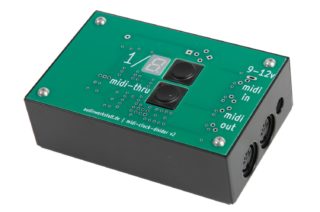 Audiowerkstatt‘s Olaf Giesbrecht let us know that their midi-clock-divider v2 is now available.
Audiowerkstatt‘s Olaf Giesbrecht let us know that their midi-clock-divider v2 is now available.
The midi-clock-divider v2 has all functions of the original audiowerkstatt midi-clock-divider, but comes in a powder-coated steel-enclouser and stores its settings.
Here’s what Giesbrecht has to say about it:
The audiowerkstatt midi-clock-divider v2 divides the MIDI-clock of the MIDI-master, whereby the MIDI-slave runs correspondingly slower. The division-ratios are 1/1, 1/2, 1/3, …, 1/8, 1/9.
If the division-factor 1/1 is selected, the MIDI-clock is simply passed through. With the division-factor of 1/2 the MIDI-slave runs at half the speed. So 16ths-notes will be 8th-notes and the loop is twice as long.
Very useful to double the loop length of the MIDI-slave (eg MIDI-sequencer or [audio-]looper). When using the division-factor 1/8 and an originally one bar long loop runs over 8 bars.
And good for experimental musicians, especially if an odd division-factor is selected and MIDI-master and slave seem to be not in sync, but from time to time come together in perfect sync.
You can also set whether only the newly created MIDI-clock and mmc commands (start, stop, continue) are sent or the, at the MIDI-in incoming data, will be mixed with that.
All settings will be saved and restored at startup.
Pricing and Availability
The midi-clock-divider v2 is available now for 125,21 € + VAT.

I personally can’t think of any situation that would require a dedicated box for this particular task. Same for their clock shifter. Does anyone?
Whenever I need a specific midi hack in my setup, I can usually solve it with an Arduino equipped with midi shield.
Magic things happen, when your slave runs on 1/3, 1/5, 1/7…
I personally can´t think of anyone who would programm an Arduino while making music.
“Whenever I need a specific midi hack in my setup, I can usually solve it with an Arduino equipped with midi shield.”
Said no musician ever.
Seriously, though, great that you’re a hacker, but this sort of thing is a niche tool and the musicians that need it will appreciate having it available, without need info hack and code an Arduino app.
This is perfect for JD-Xi users. The JD-Xi’s built in sequencer normally only supports four-bar sequences; however, it’s possible to have the four bars be 32nd note bars. By using this clock divider, we can reduce the tempo by 50%, and have eight 16-note bars sequenced by the JD-Xi (complete with Roland Grid programming, etc.), while having other gear run at a normal tempo.
My li’l Arturia Minibrute can already divide and multiply the clock-base, in addition to changing the sequencer notes from 1/8, 1/16, etc.. including triplets. This control is pretty basic, and I’m kinda shocked it’s not on all synths.